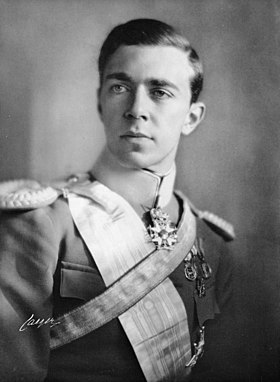Henry Louis Wunna Kan Caelum
| Henry Louis Wunna Kan (ဝဏ္ဏကံ) | |||||||||
|---|---|---|---|---|---|---|---|---|---|
 | |||||||||
| King of Bethausia | |||||||||
| Reign | 18 December 1965 – 19 August 1995 | ||||||||
| Coronation | 19 December 1965 | ||||||||
| Predecessor | Judit Valpuri Yadanar | ||||||||
| Successor | William Edwardius II | ||||||||
| Regent | |||||||||
| Born | 19 April 1921 Caernarvon, Lucis, United Kingdom | ||||||||
| Spouse | Marika Vuorinen, Duchess Consort of Bethausia | ||||||||
| Issue | William Edwardius II, King of Bethausia Mariannette George Edward, King of the Guinea Islands | ||||||||
| |||||||||
| House | Konbaung-Seppayilä-Caelum | ||||||||
| Father | William Edwardius Caelum | ||||||||
| Mother | Judit Valpuri Yadanar | ||||||||
Henry Louis Wunna Kan Caelum (19 April 1921), known solely by his standalone English and Burmese names Henry Louis and Wunna Kan (ဝဏ္ဏကံ), is a former King of Bethausia from 1965 to 1995. He is known for dissolving the Assembly of the Royal Union three years after his ascension and enforcing martial law during the height of the War of Lorican Aggression, and reforming the Bethausian constitution that granted the Tatmadaw significant influence in government. He garnered the Burmese and German monikers Bolhkyaote (ဗိုလ်ချုပ်) and General König, both meaning General King, for his militaristic sentiments combined with hardline anti-communist beliefs, and his favoritism towards the military.
Henry Louis was born on 19 April 1921 in Caernarvon, Lucis as the eldest child of Grand Dukes William Edwardius I and Judit Valpuri Yadanar. In his teenage years, he grew more interested in politics, and was urged by his parents to attend council sessions of the Free Bethausian government. At the age of eighteen, he attended the Ohnmar Myine Officers' Academy and graduated as a captain in 1942. He fought in the Free Bethausian Army of the East, and participated in the last stages of the Second Battle of Seleucia, the entirety of the Afghania Campaign, Nepali-Bhutania Campaign, the Liberation of Indiae, the liberations of Kyachindwin and Bethausia, Operation Arbiter and the Central Highlands Campaign. Throughout the Asianna and the Pacific Campaign, Zaw Sein Arkar and Yarzar Htun Tun Yaza were supplemental mentors, to which he formed close bonds with. However, he was court-martialed upon his unit participating in the Phan Lãnh Massacre during Bloody Highway, but was acquitted on grounds of losing control of his men while attempting to rally them.
After the restoration of the Bethausian throne in 1946, Henry Louis stepped up his participation in government affairs, attending with his parents in meetings, and even going so far as to represent them in the later years of his parents' reign. In 1955, he married Aasialainer Marika Vourinen, the eldest daughter of the Admiral Jalmari Zeyar Vourinen. After his father's death in 1965 and his mother's subsequent abdication, Henry Louis ascended the throne on 18 December 1965. In 1968, the war situation worsened due to increasing communist insurgencies throughout the peripheral provinces. In response to this, Henry Louis declared martial law. In 10 June of the same year, with increasing opposition from the left wing, Henry Louis dissolved the Assembly of the Royal Union with support from the military. Six days later, he assented a new constitution that enabled the military to hold a considerable amount of seats in parliament and several powerful offices in government, such as Prime Minister, Minister of the Interior, Minister of Foreign Affairs, and Minister of Border Affairs. From 1968 to 1995, Bethausia underwent a mix of monarchy and military rule alongside economic recovery. He continued to provide financial and political support for the military, especially in its efforts in suppressing the remaining communist rebel factions. The country also observed a decrease in civil and political freedoms, which exacerbated well into the early 1990s. Popular support overtime waned, and it dived significantly with his complicity in the 1991 Crackdowns and the corruption scandals with the military and government officials. Through a nonviolent protest led by Aeindra Inzali Zin Kyaw and supported by Senior General Mg Myint Thet, Henry Louis abdicated on 19 August 1995. He was succeeded by his son, William Edwardius II, who also abdicated due to a scandal in favour of his son and Henry's grandson, William Edwardius III.
Henry Louis's reign was controversial. Under his reign, the post-war economic situation generally improved, surpassing its pre-war condition. However, it was criticized for authoritarian and repressive measures against suspected communist activists, stifling opposition with defamation, the censorship of free press, anti-labor union laws, and its quasi-military junta rule. The military continued to be a tangible presence after his reign until the end of the FUA Crisis when William Edwardius III abolished its political powers.
Early Life
Reign
Personal Life
Titles and honours
Titles and styles
- 19 April 1921 – 1 September 1945: His Highness Prince Henry Louis Wunna Kan Caelum
- 1 September 1945 – 17 December 1965: His Royal Highness Crown Prince Henry Louis Wunna Kan Caelum
- 18 December 1965: His Majesty The King of Bethausia
Barmian regnal name
Henry Louis's regnal name in a mix of Sanskrit and Pali is:
Siri Pavaravijaya Yuddhevijyi Śāntipālka Mahādhammarājadhirāja
The Burmese translation is:
သီရိပဝရ ဝိဇယာနန္တ စစ်ပွဲတွင်အောင်ပွဲခံ ငြိမ်းချမ်းရေးထိန်းသိမ်းသူ မဟာဓမ္မရာဇာဓိရာဇာ
The English translation is:
Great Prosperous King of Kings, Victorious in War, Maintainer of Peace